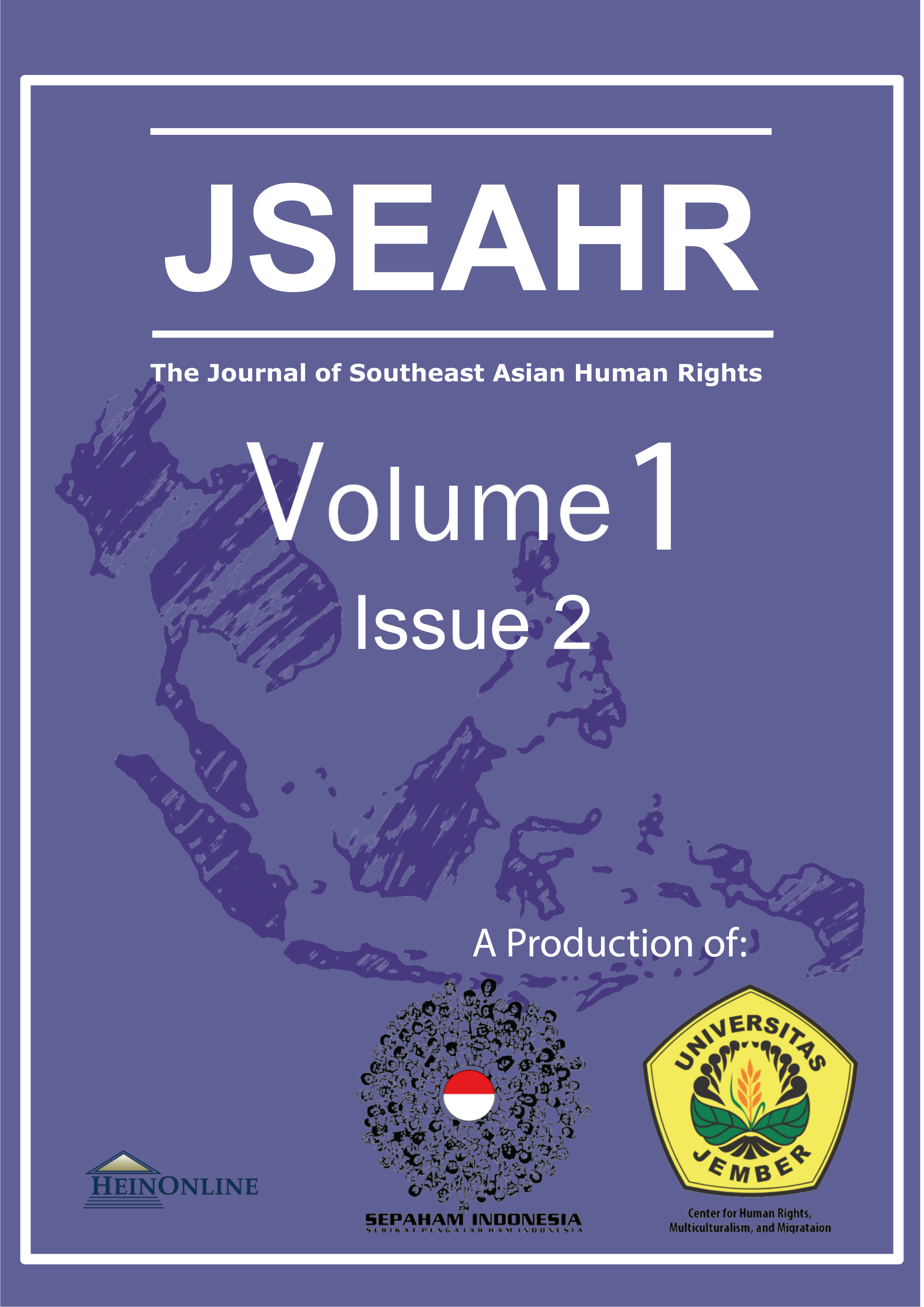Defending Environmental Rights: an Ecological Democracy Perspective
an Ecological Democracy Perspective
DOI:
https://doi.org/10.19184/jseahr.v1i2.5283Abstract
Environmental problems are amongst the most complex issues faced by the government. The reason why such problem is difficult to tackle lie within its basic assumption which often contradictory to the country’s development agenda. Take an example of Cement Plant controversy that happened recently – the plant that situated in Mount Kendeng, Pati, Central Java, considered harmful to the surrounding and threatening the environmental right of the people who lives in nearby areas. This case can be referred as government misconduct on neglecting basic environmental right. Environmental rights itself are commonly understood as the reformulation and expansion of existing human rights and duties in the context of environmental protection. However, although it has received much attention at grass root level conveyed by activist group and people based community, environmental rights still do not have strong recognition, whether in domestic level and also in international level. Therefore, this research attempt to modulate recognition on environmental right by emphasizing ecological democracy perspective, particularly in public participation in environmental policy making. Public participation is vital to ecological democracy as the key to sustainable development and in defending the environmental rights. The concept itself tries to bridge the government and public needs – to ensure that the public can participate in any ways by providing feedback and solutions. There are three main types of environmental rights – procedural, substantive, and solidarity. As for this research, we will focus on solidarity aspects, to explain the public engagement in environmental policy making.
Downloads
References
Baylis, John & Steve Smith, The Globalization of World Politics, (New York: University Press, 2001).
Bruch, C., “Breathing Life into Fundamental Principles: Implementing Constitutional Environmental Protections in Africaâ€, in Ribot, J. C. and Veit, P. G., Environmental Governance in Africa, Working Paper Series, (Washington D.C., USA: World Resources Institute, 2002).
Burns, Tony, “What is Politics? Robinson Crusoe, Deep Ecology and Immanuel Kantâ€, Politics vol. 2, no. 2, (Oxford: Blackwell Publisher, 2002).
Dobson, Andrew, Green Political Thought, 4th ed., (New York: Routledge, 2007).
Erwin, Muhammad, Hukum Lingkungan dalam Sistem Kebijakan Pembangunan Lingkungan Hidup, (Bandung: Refika Aditama, 2008).
Githinji, P.K., Dressing Political Democracy with Ethics, (2006), SIEMENPUU Discussion papers, p. 6-11.
Hayness, J, Demokrasi dan Masyarakat Sipil di Dunia Ketiga: Gerakan Politik Baru Kaum Terpinggir, (Jakarta: Yayasan Obor Indonesia, 2000).
Humprey, Matthew, Ecological Politics and Democratic Theory: The Challenge to the Deliberative Ideal, (London: Routledge, 2008).
Mitchell, R.E. “Green politics or environmental blues? Analyzing Ecological Democracy†(2006), 15: 459-480, Public Understanding of Science.
Nga, D, Participation – A Critical Concept in Development. (2006), SIEMENPUU Discussion papers, p. 19-25.
Ratner, Blake, “Environmental Rights As A Matter Of Survival†(2004), 2:11, Human Rights Dialogue, p. 6-7.
Shutkin, W. A., The Land that Could Be: Environmentalism and Democracy in the Twenty-first Century, (Cambridge, MA: MIT Press, 2000).
Viotti, Paul & Mark Kauppi, International Relations Theory: Realism, Pluralism, Globalism, (London: Macmillan Pub., 1993).
White, Brian, Richard Little & Michael Smith (ed), Issues in World Politics, (New York: St. Martin Press, 1997).







